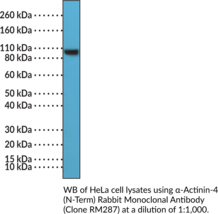Territorial Availability: Available through Bertin Technologies only in France
- Correlated keywords
- immuno chemical cross-linking cyto skeletal antiparallel coactivator NF?B proteo toxicity over-expressed histochemistry histo chemistry immunohisto ACTN-4 glomerulo sclerosis FSGS-1
- Product Overview:
?-Actinin-4 (ACTN4) is a filamentous actin-crosslinking protein and member of the ?-actinin protein family with roles in the regulation of cytoskeletal integrity and cell movement, as well as gene transcription.{59664,59662} It is composed of an N-terminal actin-binding region with two calponin-homology repeats, a rod domain containing four spectrin-like repeats that is essential for anti-parallel dimerization, and a C-terminal calmodulin-like domain.{59664} ACTN4 is ubiquitously expressed in non-muscle cells and primarily localized to the cytoplasm where it participates in cytoskeletal organization.{59662} However, ACTN4 can be translocated to the nucleus and induce transcription via interaction with nuclear receptors, including estrogen receptor ?, retinoic acid receptors (RARs), and the vitamin D receptor, and acts as a transcriptional co-activator of NF-?B. Mutation of ACTN4 induces podocyte injury caused by cytoskeletal dysregulation and proteotoxicity and has been seen in patients with hereditary focal segmental glomerulosclerosis.{59663} ACTN4 is overexpressed and associated with tumor metastasis in various cancers.{59662} Cayman’s ?-Actinin-4 (N-Term) Rabbit Monoclonal Antibody can be used for immunohistochemistry (IHC) and Western blot (WB) applications.
Cayman Chemical’s mission is to help make research possible by supplying scientists worldwide with the basic research tools necessary for advancing human and animal health. Our utmost commitment to healthcare researchers is to offer the highest quality products with an affordable pricing policy.
Our scientists are experts in the synthesis, purification, and characterization of biochemicals ranging from small drug-like heterocycles to complex biolipids, fatty acids, and many others. We are also highly skilled in all aspects of assay and antibody development, protein expression, crystallization, and structure determination.
Over the past thirty years, Cayman developed a deep knowledge base in lipid biochemistry, including research involving the arachidonic acid cascade, inositol phosphates, and cannabinoids. This knowledge enabled the production of reagents of exceptional quality for cancer, oxidative injury, epigenetics, neuroscience, inflammation, metabolism, and many additional lines of research.
Our organic and analytical chemists specialize in the rapid development of manufacturing processes and analytical methods to carry out clinical and commercial GMP-API production. Pre-clinical drug discovery efforts are currently underway in the areas of bone restoration and repair, muscular dystrophy, oncology, and inflammation. A separate group of Ph.D.-level scientists are dedicated to offering Hit-to-Lead Discovery and Profiling Services for epigenetic targets. Our knowledgeable chemists can be contracted to perform complete sample analysis for analytes measured by the majority of our assays. We also offer a wide range of analytical services using LC-MS/MS, HPLC, GC, and many other techniques.
Accreditations
ISO/IEC 17025:2005
ISO Guide 34:2009
Cayman is a leader in the field of emerging drugs of abuse, providing high-purity Schedule I-V Controlled Substances to federally-licensed laboratories and qualified academic research institutions for forensic analyses. We are certified by ACLASS Accreditation Services with dual accreditation to ISO/IEC 17025:2005 and ISO Guide 34:2009.





